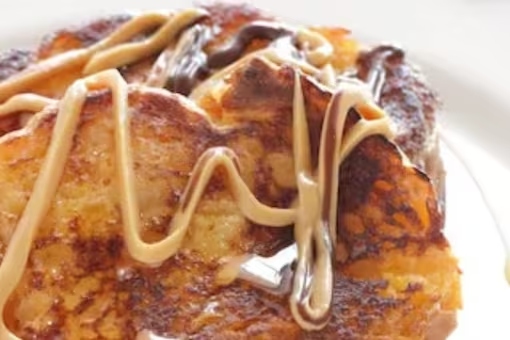Mornings can be overwhelming with daily tasks and work preparations, sometimes leading to neglecting breakfast. While skipping meals isn’t recommended, quick options like ready-to-eat foods can be unexciting. To address this, consider setting aside 15 minutes for a tasty homemade meal. There are many quick recipes available if you plan and have ingredients ready. Here, we present a delightful French toast recipe with a healthy twist, incorporating a generous portion of peanut butter. It’s a delicious choice!
French toast is an uncomplicated dish, needing minimal ingredients and swift preparation. Moreover, it’s customizable to suit preferences, ranging from indulgent variations to healthier ones with ingredients like oat flour and banana. Its appeal as a favoured breakfast option lies in its satisfying nature, providing a balance of protein, carbs, and healthy fats. The delightful taste of French toast contributes to starting the day positively.
How to make French toast peanut butter?
Step 1: Whisk eggs, milk, vanilla extract, and cinnamon together in a bowl.
Step 2: Spread peanut butter evenly on one side of each bread slice. If the peanut butter is thick, microwave it briefly for easier spreading.
Step 3: Heat a large skillet over medium heat and add butter. Allow the butter to melt.
Step 4: Dip each slice of bread into the egg mixture, ensuring both sides are coated.
Step 5: Place the coated bread slices onto the skillet and cook until they turn golden brown on each side.
Step 6: Once cooked, top the French toast with maple syrup, fresh berries, or banana slices.
Step 7: Serve the French toast hot and enjoy your delicious breakfast!
Benefits of French Toast Peanut Butter
Rich in Protein:
Peanut butter offers a notable protein content, crucial for tissue repair and growth. Just two tablespoons of peanut butter encompass roughly seven grams of protein.
Healthy Fats Abound:
Abundant in monounsaturated and polyunsaturated fats, peanut butter promotes heart health by lowering bad cholesterol levels and decreasing heart disease risk.
Nutrient-Rich Composition:
Peanut butter presents a wealth of vitamins and minerals, such as vitamin E, magnesium, and potassium, contributing to its nutritional value.
Minimal Carbs:
Peanut butter boasts low carbohydrate content, making it suitable for those adhering to a low-carb diet.
Weight Management Potential:
Surprisingly, despite its calorie density, moderate peanut butter consumption has been linked to weight management. It’s substantial protein and healthy fat content contribute to a prolonged feeling of fullness, aiding in weight control.


